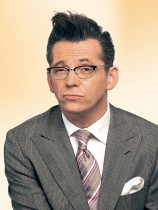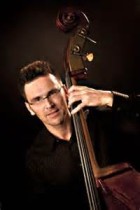CD: L.I.E.B.E.





There is hardly anything more highly valued or artistically more valuable than establishing a completely separate genre, developing an unmistakable style, placing a highly individual voice - and always treading new paths, delivering surprising results and inspiring audiences everywhere. Götz Alsmann manages this consistently in a brilliant way, and has been doing it for decades (... well, we are all not getting any younger).
The singer and musician, who can justifiably be described as a master of German jazz hit, is present on a wide variety of instruments not only in the studio or on the live stage. He also proves to be a real all-round talent. Whether as a long-time co-presenter of the celebrated TV show "Zimmer frei" or as a radio DJ (once as "Professor Bop", today with "Go, Götz, Go" and "WDR 3 personally"), as a presenter of classical music in of the ZDF program "Götz Alsmanns Nachtmusik", creator of a Michael Jary revue for the Stadttheater Münster or as an audio book speaker, the doctorate in musicology is doing very well on all possible media and cultural levels He is also still history of popular music at the University of Münster, and the term boredom is probably missing from his vocabulary.
Of course, the actual musician's career is always at the center of his activities. With his latest project, the studio album "L.I.E.B.E.", Götz Alsmann is returning to the good, old, true German Schlager songs. Quotation Alsmann: "After albums and tour programs, which in the course of the last decade have mainly dealt with the hit worlds of the French, Italians and Broadway, I felt the urge to get back to the great tradition of the last hundred years of German-language hit history."
We are talking on the one hand of the successful album trilogy "In Paris" (2011), "On Broadway" (2014) and "In Rom" (2017), published on the famous jazz label Blue Note, and on the other hand of his A penchant for the inexhaustible and motley hit art of the past. There he continually discovers the old and brings it to light in an updated and refreshed way, legendary or almost forgotten composers like the aforementioned Michael Jary, Rudolf Nelson or Heinz Gietz, lyricists like Bruno Balz, Hans Bradtke and Hans Fritz Beckmann, interpreters like Rudi Schuricke, Zarah Leander, Caterina Valente or the 3 Travelers. With this current collection of songs, he is also building on his first two Blue Note records, "My Secret" (2007) and "Engel Of Teufel" (2009). "LOVE." is now his sixth release on Blue Note.
The palette of songs he has chosen for the new album ranges from Bert Kaempfert's mid-60s composition "L.I.E.B.E." as the opener - Nat King Cole made it as "L.O.V.E." globally immortal - up to the Ilse Werner title "The small town wants to go to sleep" from 1940 as the finale. In between there are treasures such as "One should be able to play the piano" by Johannes Heesters from the 1941 sound film "Immer nur You", presented here in a rockabilly version, Greetje Kauffeld's sarcastic account of lovers "Just a bad copy" from 1961 or "What I want to tell you" from the pen of Udo Jürgens and Joachim "Blacky" Fuchsberger.
Alsmann quote: "A Brazilian bossa nova classic and an American folk song are also on board, along with their historical German lyrics - two of my all-time favorites. You consider them to be the exotic flavor of the whole thing." These are "Samba de Verão" by Marcus Valle, sung in German at the end of the 1960s by France Gall ("Such a young man"), as well as "Greenfields" by the Brothers Four, the one by the chansonist Jean-Claude Pascal was covered ("Where are the fields").
For the actual recordings, he went to Berlin for a week in summer 2020 with his tried and tested musicians Altfrid Maria Sicking (vibraphone, xylophone, trumpet), Ingo Senst (double bass), Dominik Hahn (drums) and Markus Paßlick (percussion) legendary "Hansa-Studio 1", on the other hand in the north of the capital in the "b-sharp Studio" the Swonderful Orchestra under the direction of Fabrizio Ventura was ready to refine some songs orchestral. With the well-known German producer Christoph Israel, he had a man at his side, whose vita of the collaboration mainly records Max Raabe, Dominique Horwitz and Annette Humpe. The two-time Grammy winner Philipp Nedel acted as the sound engineer on the controls.
Together with all those involved, Götz Alsmann succeeds again in a fascinating way, with fine arrangements, discreetly impulsive play by the band or orchestra and his unmistakable, sensitive voice, to create exactly that exciting musical atmosphere that the audience ... yes, delight is the appropriate word. Which is hardly a wonder, because he explains in the liner notes: "We often bask in the moments of happiness that always come when pop and jazz shake hands."
The album "L.I.E.B.E." will be released on November 27th. in digital form and as a standard CD with 18 tracks each. The separately available special editions as digipack CD and double vinyl LP come up with two bonus tracks.
Götz Alsmann, born in 1957, continues to live in the Westphalian city of Münster, the city of his birth. He has been publishing records under his own name since 1982 (including the chart hit "People Are People" with the Sentimental Pounders in 1985), and for a good 20 years he has focused primarily on music in the German language. Some of his recordings have been awarded prizes (Echo Jazz, Goldene Stimmgabel). For the TV show "Zimmer frei" (WDR), which ended in 2016 after 20 years and almost 700 episodes, he and Christine Westermann received the Grimme Prize in 2000 and the German Comedy Prize (special prize) in 2016.